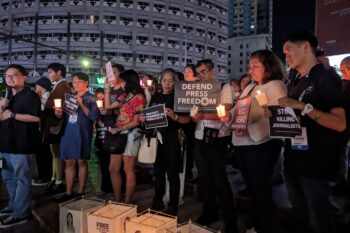Jolo is unique in many aspects. Right at the heart of the municipality is a beautiful cathedral near the airport. PAL (Philippine Airlines) pilots before had complained about its tall belfry. When they petitioned the Muslim mayor to remove it, the mayor told them to transfer the airport somewhere else.
One bright morning, a lady entered my office. “Father, I want my child baptized,” she said in a polite manner. I looked at her turong (veil) and was speechless for a while. I knew she was a Muslim but why would she want her child to be a Christian?
I do not want to baptize a Muslim myself lest I be accused of engaging in conversion. And so I asked her, “Are you sure you want your child baptized?”
“Yes, Father,” she answered. “My husband is a Christian,” she added, sensing my reservation.
In Jolo, mixed marriages between Muslims and Christians are a common practice. Children of the couple are either baptized in the Christian or Muslim rite depending on the consensus of the parents.
“Does your husband know that you are going to have your child baptized in the Catholic Church,” I asked again.
“Yes,” she said.
“But where is he?’ I asked curiously.
“He is on duty. He is a member of the PNP (Philippine National Police) and he could not come,” she answered.
Then, she said something that caught me by surprise. “Father, I want half of the sponsors to be
Muslims,” she declared.
I did not react immediately. I was trying to formulate my answer in a way that she would understand easily
“Okay,” I said, “We have no problem baptizing your child but we could not allow Muslim sponsors.” I had not even finished explaining when the lady started to react.
“I didn’t know that you discriminate here in your Church. In Islam, we don’t discriminate. Whenever there is a pagunting (Muslim ritual for baptism) we invite the Christians. You should be happy that I want my child baptized as a Christian. All that I am asking is that half of the sponsors of my child will be Muslims,” the lady said, with a tone of indifference in her voice.
I stayed calm. I knew that it was my responsibility to explain to the lady.
“In our Christian tradition,” I said, “baptism is not just a social event but a religious event. The sponsors virtually become second parents and they assist the parents to help the child grow to become a mature Christian.”
“Besides,” I continued, “during the baptismal ceremony itself, sponsors say Catholic prayers and do Catholic gestures such as making the sign of the cross. I don’t want to oblige the Muslim sponsors to make the sign of the cross and I don’t want them to do it just for its own sake without really meaning it. Otherwise, it will just make fun of the whole religious ceremony.”
The lady obviously was satisfied with my explanation and she relented. “So what shall I do, then, because I have already informed them,” the Muslim lady asked referring to the supposed Muslim sponsors, her voice mellowing down this time.
“Well, you can tell the Muslim sponsors,” I told her as I offered a win-win solution, “that they could attend the celebration in the church as witnesses and not exactly as sponsors. Their names, however, will not appear in the baptismal certificate of the child.”
The Muslim lady was finally appeased.
I remember the story of one of my superiors in the seminary when he was studying in Rome. He was to take the final exam in Canon Law and when his professor learned that he was going to mission, his professor jokingly said, “I see you’re going to the mission. Forget about your
Canon Law. You won’t need it there.”
The baptism took place at the cathedral the following Sunday with Christian sponsors and Muslim witnesses. (This is one of the stories from the recently-launched book, “Fields of Hope: Stories of Inter-religious Dialogue and Peace-building” by Fr. Roberto C. Layson, OMI, published by MindaNews with the assistance of the Australian Aid for International Development).
